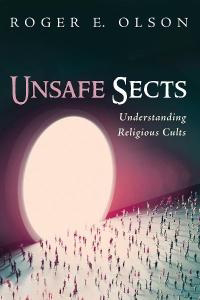ROGER E. OLSON
PATHEOS
SEPTEMBER 13, 2023
Unsafe Sects: Understanding Religious Cults
Yesterday I received my complimentary copies of this, my newest book: Unsafe Sects: Understanding Religious Cults published by Wipf & Stock under their Cascade Books imprint. I have described the book here before. What surprised me was the two absolutely stellar recommendations on the book’s back cover. I have posted a pic here of the back cover showing them. Both are by former colleagues of mine. In case you don’t know who Philip Jenkins is, he is a world renowned scholar about religious history who has published many books, some of which I have reviewed here. I assume you know who Greg Boyd is. If not, look him up. Also a world renowned theologian and author of many books.
Here are the two mentioned promotional statements, recommendations:
“On a subject as emotive as ‘cults’ it is very good to find in Unsafe Sects an analysis that is at once shrewd and judicious, knowledgeable and wide-ranging. Particularly valuable, and powerful, are Roger Olson’s observations of a trouble and even ‘unsafe’ religious environment that he has experienced firsthand. There is much of value here.” Philip Jenkins, distinguished professor of history, Baylor University
“In Unsafe Sects, Roger Olson empowers readers to identify for themselves the ‘cult-like characteristics’ of groups they should be wary of. Olson certainly doesn’t pull any punches when it comes to critiquing cultish groups, but his treatment is always highly informed, deeply respectful, and uniformly fair. This well-written book is the most practically helpful work on ‘cults’ and ‘unsafe sects’ I’ve ever read, and I could not recommend it more strongly to all who are interested in identifying these groups.” Greg Boyd, author of Letters from a Skeptic
Why did I write Unsafe Sects? Because the word “cult” has escaped into popular language as well as into journalism and news reporting and Youtube documentaries. Almost anything can be a cult, now, depending on who is writing or talking, and, paradoxically, many people think a cult is necessarily only a violent or potentially violent religious sect.
In the book I try to corral the word “cult” back into some useful and fairly limited realm of meaning while at the same time arguing that it should be applied not only to violent or potentially violent religious groups or only to heretical sects (as many anti-cultists claim) but also to even biblical-orthodox Christian churches that are abusive in any number of ways. I dedicate an entire chapter to my own “brush” with a cultish religious organization that had sound doctrines but was extremely authoritarian and abusive.
Someone here complained about the book’s length (or lack of it) and said I must be “slowing down.” Well, first, of course I’m slowing down simply due to my age. But, second, many highly regarded theologians have written very brief books that were and are nevertheless widely read and studied. Just recently I have been trying to locate a used copy (the book is now only available in Kindle format) of a book by a well-known Scottish theologian who has written numerous books. This particular one is only 89 pages long and is yet required reading in at least one PhD program.
Yes, my book is brief (about 100 pages) and that is purposeful. Many people simply will not read a non-fiction book that is “big.” I want this book to get into the “hands” of many people who have friends or loved ones caught in an unsafe religious sect/cult.
In the book I also argue that perhaps we must scrap the word “cult” for all but the very worst religious groups (violent or potentially violent) and talk about “cultic features” and “cultishness.” Over the years I have encountered close up many, many churches and religious organizations that I would not call cults (because of the extremely pejorative connotation of that word) but that I judge to be “cultish” or have “cultic features.” I would not join any such religious organization or church.
A very common such is a church whose leadership is secretive, furtive, closed to inquiry by common members. Another one, often accompanying that one, is a church whose leadership that shames any member who asks the wrong kind of question. I’m talking about a question regarding the truth of what is being preached or taught and/or regarding the ethical conduct of the leaders.
I hope you will consider buying and reading Unsafe Sects. Please recommend it to pastors and teachers and anyone who has any interest in or concern with cultic religious groups including perfectly doctrinally orthodox churches.
https://www.patheos.com/blogs/rogereolson/2023/09/unsafe-sects-understanding-religious-cults/


No comments:
Post a Comment